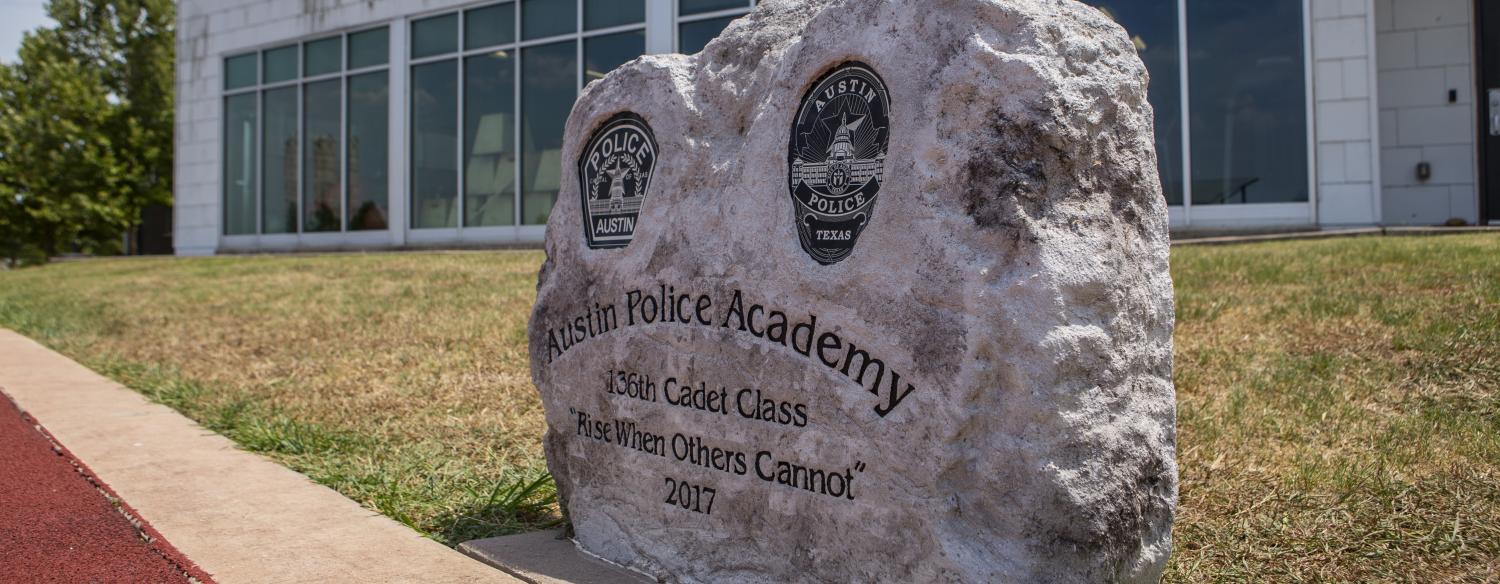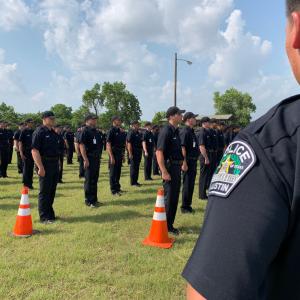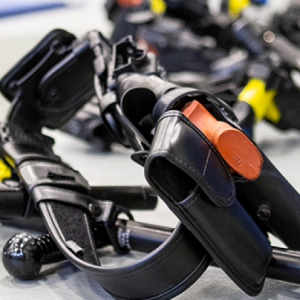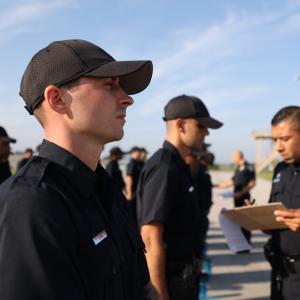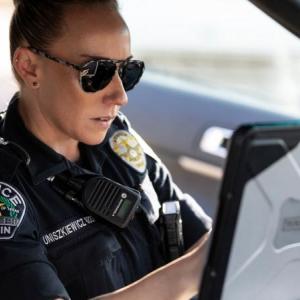Academy
The Austin Police Department Training Academy is a state-of-the-art training facility located in southeast Austin, near the Austin-Bergstrom International Airport. Our academy is part of the Public Safety Training Campus and is shared with the Austin Fire Department and Austin-Travis County EMS. The training campus features classrooms, gyms, a firearm range, driving track, and houses the entire Training Academy staff. All police cadets will train at this location for the duration of the academy but will not live on site. Training hours are typically Monday through Friday from 7 a.m. – 4 p.m. Occasional nights and/or weekends are required in lieu of day shifts, depending on the curriculum. The police academy is a mentally and physically challenging undertaking, but our certified training instructors are ready to set you up for success – you’ve just got to get yourself here and give us your best effort. If you know that you would make a great police officer, we challenge you to apply. Scroll through this page to learn about our hiring process, training academy, and how to apply. We build the finest police officers in the nation.
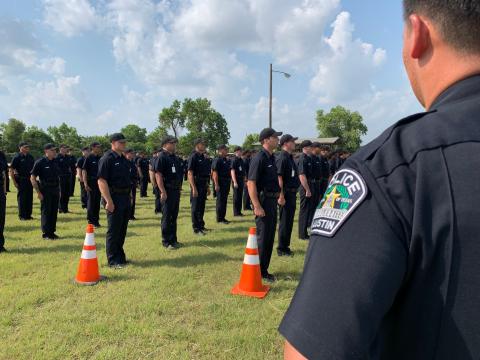
REGULAR ACADEMY
All police officer candidates will attend a Regular Academy. We hold 2-3 academy classes per year with each comprised of approximately eight months of training. Prior law enforcement experience is not required. Upon graduation, newly appointed officers are placed into a 12-week Field Training Program with a certified Field Training Officer. After successful completion of the Field Training Program, the officer is assigned to a permanent patrol shift and will report to a Corporal and Sergeant. Visit the Career Paths page to learn about our specialized units and opportunities to promote. View the Hiring Process page of our website for a list of minimum requirements and the link to apply.
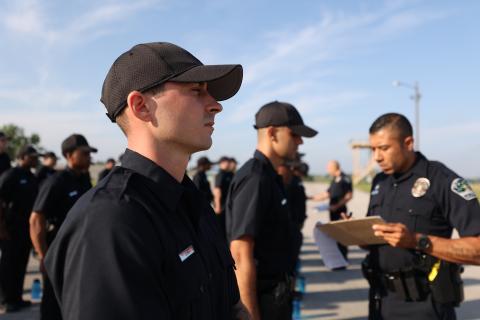
CADET TRAINING
The three major components of the academy are Physical Training, Academics, and Skills. Each component is equally important. Scroll through the sections below to learn what you will experience during your training at the police academy. Be sure to click ‘Read More’ to expand the section.
Physical Training
Physical training in the academy is challenging and is meant to prepare you to be in the best shape possible before beginning your career on patrol. Cadets will engage in regular physical training beginning the first week of the academy and it will last throughout the duration of the academy, becoming increasingly complex. The conditioning you begin with and maintain is meant to put you in the shape you’ll need to be in to properly learn other skills such as defensive tactics and to also learn your physical limitations. In addition to a variety of physical conditioning exercises and skills training requiring great strength and cardio shape, cadets must also complete a physical fitness test with a minimum 80% average to graduate the police academy.
- Read More
-
Academics
Cadets will study a range of topics throughout the police academy, including:
- Written communication/report writing
- Code of Criminal Procedure (CCP)
- Texas Penal Code
- Austin City Ordinances
- Traffic Laws
- Arrest, Search and Seizure
- Criminal Investigations
Cadets will learn through classroom instruction, hands on/partner training, and will later apply these skills to scenario-based training/role play. All skills are taught by certified and highly experienced instructors who recognize that skill levels vary among police cadets. Ultimately you will be assessed and scored for each skill and for your ability to make decisions throughout role play scenarios that are in accordance with Department policy, Texas State laws, as well as our guiding principles. As with all other exams and physical testing, you must maintain an 80% average to graduate the police academy.
Cadets must maintain an 80% average on all exams in order to graduate the police academy. Do not underestimate the amount of studying necessary to successfully pass your exams! We lose a number of applicants because they were not mentally prepared or hadn’t taken proper measures to create better study habits prior to entering the academy.
Skills Training
Police cadets will learn a number of vital skills prior to graduating the academy, including:
- Safe Handling and Shooting of Firearms
- Driving
- Defensive Tactics (DT)
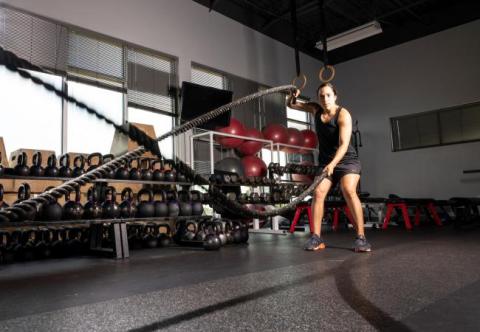
HOW TO PREPARE
The Austin Police Department’s Regular Academy is extremely physically and mentally challenging and should not be underestimated. Cadets engage in classroom instruction, work on projects, conduct physical training, skills training, and take a number of exams throughout the duration of the academy. The number one reason we see cadets fail is because they were not properly prepared mentally, physically, or sometimes even emotionally for the intensity of this long-term training. Read through some of our tips below to make sure you’re well prepared for this rewarding commitment. We want to see you succeed!
- Read More
-
Physical readiness
In the police academy, cadets are required to engage in regular physical training to build strength and endurance. This training includes a variety of exercises such as sprinting, jogging, squats, push-ups, sit-ups, overhead weight carries, planks, and interval training. It is highly recommended that applicants begin a consistent cardio exercise regimen, like High-Intensity Interval Training (HIIT) or CrossFit, prior to or during the application process and continue this regimen throughout the hiring process.
To successfully complete the Training Academy Program, cadets must pass a physical fitness exam consisting of a 1.5-mile run, Push-ups and Sit-ups.Self defense
Studying self-defense, especially a form that includes grappling or ground wrestling, prior to the academy is not required but is encouraged to help you feel more at ease mentally. Our Training Academy instructors realize that not everyone has engaged in a physical fight and will teach hours upon hours of defensive tactics to make sure you are capable of properly protecting yourself before graduating the police academy. While fighting isn’t necessarily something that happens often in policing, it is important that you are capable of protecting yourself and others.
Minimizing and coping with stress
Between the 40 hour weeks at the academy and the hours you’ll spend studying, the academy can become very stressful, very quickly. We recommend trying to find ways to minimize your stress prior to entering the academy – whether that means lessening your financial obligations, finally repairing the crack in your ceiling, etc. Once you begin the academy, you’ll find that you have very limited personal time or energy for much else. It is a serious commitment and takes your best effort. Additionally, finding healthy ways of coping with stress way before the stress arrives will help ensure that you’ll be successful. You can do this!
Working as a team
If you’re used to working independently, that’s okay, but realize that policing relies on teamwork and camaraderie. Your peers in the academy will become your friends, study partners, and possibly much later, maybe even your supervisor or subordinate. Understanding the importance of working as a team is essential for a successful career in law enforcement. Need to work on it? Join a team sport or ask to be part of a group project at your current job.
Study habits
Studying every week in the academy is crucial. You will cover a large amount of material in a short amount of time. You’ll be asked to memorize information as well as apply it to scenario-based training. You will also be quizzed regularly and will have to maintain an 80% average on your exams throughout the academy. If you’ve never been to college, learning new study habits can be especially difficult. Start now by creating evening and weekend routines for yourself that include dedicated time to an activity (if you don’t already do this). Carving out time and sticking to a schedule will ensure that you’ve created discipline for yourself which will pay off for you in the academy later.
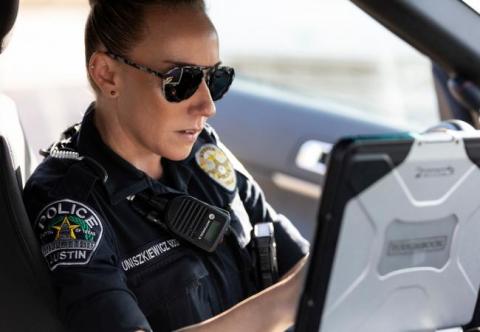
RIDE WITH AN OFFICER
Prospective applicants are encouraged to participate in the Ride Along Program prior to applying, if possible. All police officer candidates must complete a ride along with an officer toward the end of the hiring process. Any citizen or applicant wishing to participate in the program can obtain information by contacting the Public Information Office at 512-974-5017 or by viewing the printable or electronic application forms online. Be sure to plan ahead! We maintain a waiting list and it may take up to 4-6 weeks to schedule your ride.

